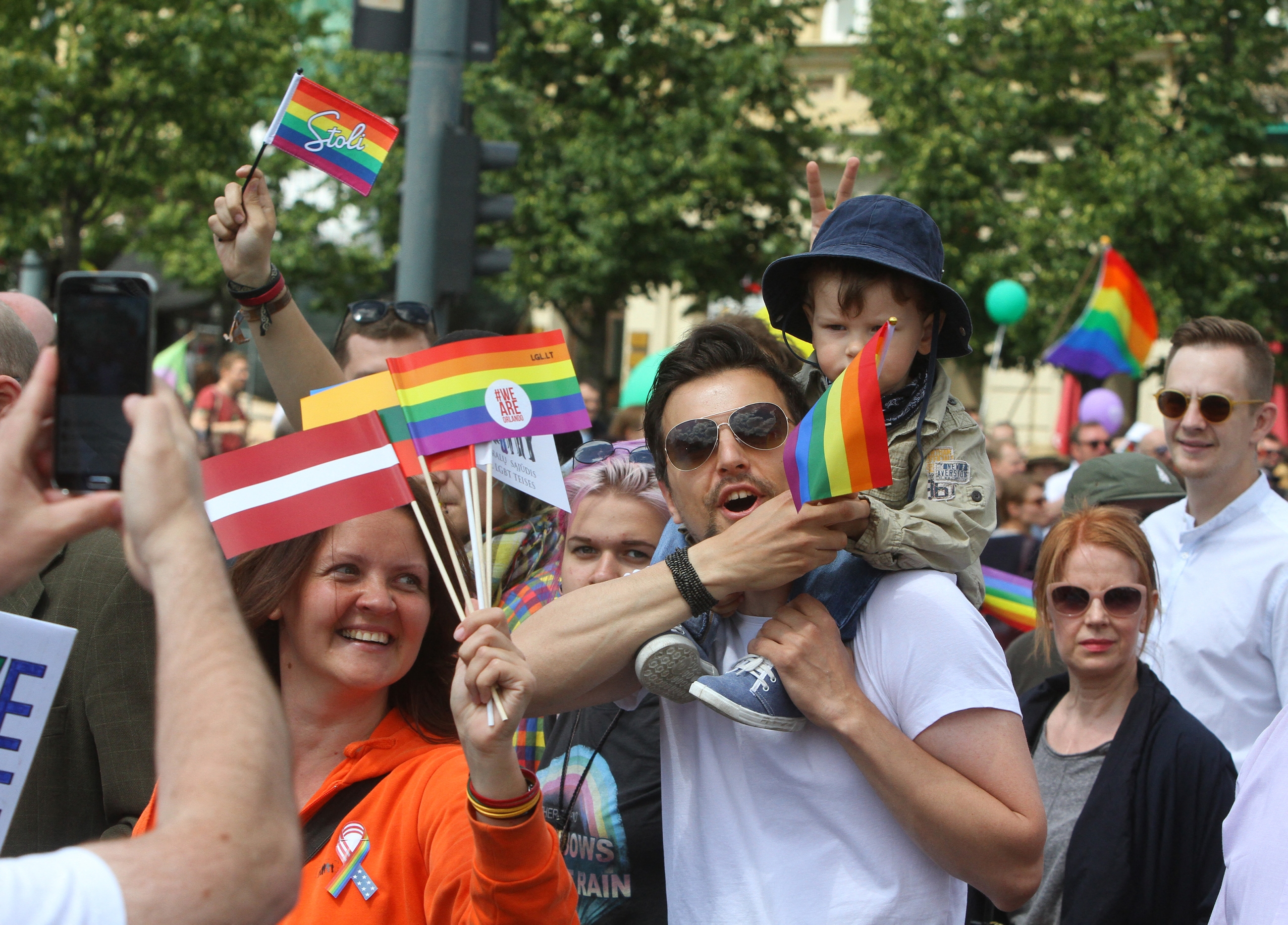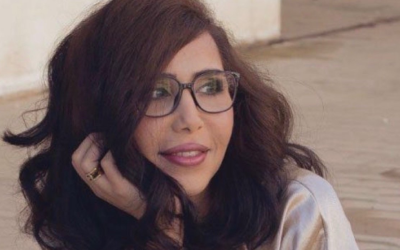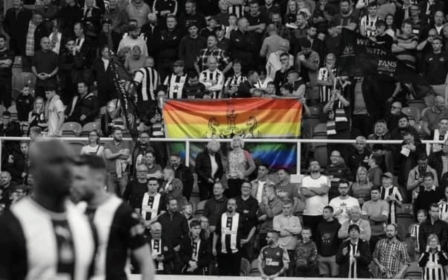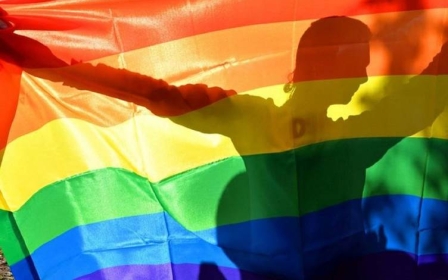LGBTQ+ Iraqis seeking refuge in Lithuania fleeing persecution at home

It was a long and arduous journey for 23-year-old Samir Hassan, but in December 2021 he and his boyfriend finally received asylum status in Lithuania after fleeing from Iraq to Belarus with his boyfriend in July of that year.
Thousands of Iraqis poured into Belarus last year following a change in the country's visa rules, attempting to find a better life in Europe.
Among those were many LGBTQ+ people who left difficult lives filled with repression, violence, and loneliness in their home country.
“After a long story of hardship at home, I succeeded in arriving in Lithuania from Belarus. Such a horrible journey I experienced but nothing comes easily, I and my boyfriend cashed lots of money to settle in a safe place," said Hassan.
He said that due to his sexual orientation he was regularly facing problems with his family and received abuse on the streets of Iraq.
'When I decided to flee, I knew well that I would never ever go back home'
- Markiza Yousif
“I was stuck in my room, my family was treating me as if I am a prisoner, not their son, they stopped me to finish my secondary school, they were unforgettable memories!” he said.
"After leaving my home, my father promised to kill me wherever he finds me, meanwhile, my mother got sick, then she was hospitalised, but sadly, she died. Imagine I was not able to attend my mother's funeral, what a bad life!”
According to the Lithuanian Interior Ministry, refugee camps in the country are currently home to around 2,000 Iraqi migrants.
A spokesperson for the ministry said that Iraqis were housed in five refugee centres where vulnerable groups such as LGBTQ+ people, minors, and families were separated.
The spokesperson said that asylum had been granted to 12 Iraqi nationals, but said the statistics did not specify the reasons why they were granted asylum and that there was no specific integration programme for LGBTQ+ people in the country.
Systemic problems
Political instability, lack of job opportunities, absence of freedom of expression, and no accountability for extra-state killings are just some of the problems which have driven so many Iraqis - including a large number of Kurdish Iraqis - from their homeland.
But for LGBTQ+ people, the threat of violence is even greater than that facing other Iraqis.
Earlier this month, 23-year-old transgender woman Doski Azad was murdered by her brother in the northern city of Dohuk in what has been branded a so-called "honour killing".
The incident, which was widely condemned both inside and outside Iraq, has left many LGBTQ+ people frightened and has helped drive those who are able, to leave the country.
“I am totally worried about LGBTQ+ members whose lives are under threat in Iraq, especially after the killing of trans woman Doski Azad," said Hassan.
In April last year, Sulaymaniyah, sometimes seen as the most liberal city in Iraq, witnessed a police operation that saw the arrest of 15 LGBTQ+ men, allegedly for prostitution.
Although the Directorate of Security in Sulaymaniyah said the arrests were not focused on any one group, operation supervisor Pshtiwan Bahadin told local media that the arrests were aimed at "homosexuals" and said they had taken place with the "cooperation of all the security forces".
Markiza Yousif, originally from Baghdad, followed the same path as Hassan to Lithuania via Belarus.
"Despite it being a harsh trip from Belarus to Lithuania, it was not worse than the situations I experienced in Iraq,” the 23-year-old said.
“When I decided to flee, I knew well that I would never ever go back home."
'Death threats and public backlash'
Although homosexuality is not against the law in Iraq, LGBTQ+ people are subject to massive discrimination and are not allowed to serve in the military.
There are also no anti-discrimination laws, meaning that abuse and violence against them are often overlooked.
“I do not think that Iraqi government will take steps to enacts laws that legalise gayness, and even if government show a will to do so, they will face opposition from political parties or even pressure from public opinion," said Yousif.
Zhiar Ali, a human rights activist originally from Sulaymaniyah who now lives in the Netherlands, spent most of his days campaigning for LGBTQ+ rights in his homeland.
“I have been targeting of death threats and public backlash due to my activism in the region, which is a well-founded proof that Kurdish society still holds tribal values and do not embrace a progressive, individualistic lifestyle, and that’s thanks to the rising influence of religious conservatives in the region, who have the power to easily influence people," he said.
He said he had been "systematically targeted" when he lived in Iraqi Kurdistan and that he was subject to attacks funded and supported by homophobic political parties and officials.
Although sexuality and the rights of sexual minorities are largely taboo among Iraqi politicians in the south, politicians in the Kurdish region have occasionally expressed more supportive positions.
Qubad Talabani, the KRG's deputy prime minister, has previously tweeted that he believed "all citizens, regardless of race, religion, gender (and or gender preference), ethnic identity, and sexual preference deserve equal rights, all over the world, and especially in Kurdistan".
But Ali is far from convinced this will have any real effect.
"I do not care what Kurdish leaders are tweeting or saying to consulates and embassies in meetings, we do not need their 'deep concern' and tokenistic efforts; we need real action. We need legislation. We want representation in politics," he said.
Ali said that living in exile did not stop him from demanding community rights, but that it was simply "impossible" to live happily and openly as an LGBTQ+ individual in Iraq.
“I am still actively advocating for Iraqi LGBTQ+ rights and will continue doing so as long as I am alive on this earth," he said.
"We are all born free and equal, and simply for being born as humans, we have basic rights. That’s internationally recognised. It is sad that many people in our country still violate these basic human rights, not only for LGBTQ+ people but for people generally."
'Hard conditions'
The ministry of interior told MEE that if a person did not agree with the decision of the Lithuanian Migration Department to deny asylum, they had the right to appeal to the courts, adding that asylum seekers were entitled to an allowance of €1,000 ($1136.65) if they choose to return voluntarily.
“At this point, we have returned 755 migrants, who expressed a wish to go back home. In any case, if a person is not granted asylum, he or she will have to return or be returned to his or her country of origin," the spokesperson said.
Yousif told MEE that his obstacles did not end after leaving home.
He said he faced hard conditions due to the cold winter weather and insufficient food, as well as having no privacy in the camp.
“I am still facing challenges inside the camp due to my gender identity or my gay-looking appearance - Iraqi guys who are live with me in the camp using insulting terms, hearing these words cause huge pain on me," he said.
"I just let them talk until they're silent."
Middle East Eye propose une couverture et une analyse indépendantes et incomparables du Moyen-Orient, de l’Afrique du Nord et d’autres régions du monde. Pour en savoir plus sur la reprise de ce contenu et les frais qui s’appliquent, veuillez remplir ce formulaire [en anglais]. Pour en savoir plus sur MEE, cliquez ici [en anglais].






